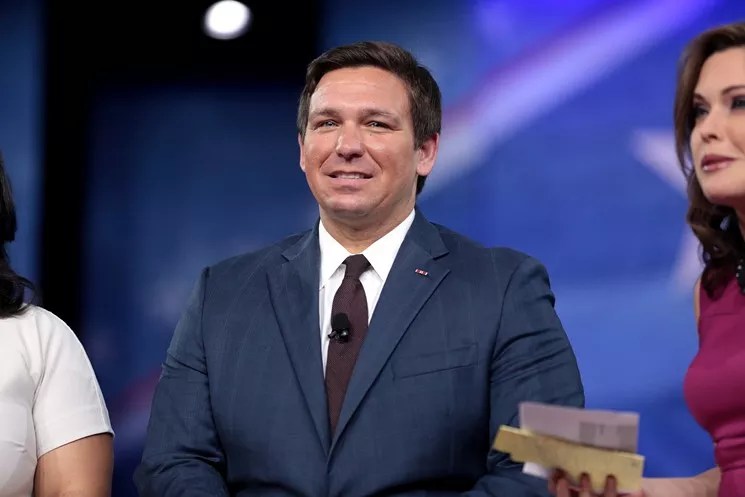
Photo by Gage Skidmore / Flickr

Audio By Carbonatix
As the U.S. moves closer to admitting record-low levels of refugees, Miami-Dade Mayor Carlos Gimenez says the county is ready to resettle additional people. But that might not be up to him anymore.
Last Thursday, President Donald Trump signed an executive order that would prohibit willing municipalities from resettling refugees without written consent from their state government. Absent further clarification, immigrant advocates worry the new order could completely block refugees from entering states with executive branches opposed to resettlement. In the case of Florida, which until the 2015 fiscal year had the largest resettlement program in the nation, that decision will fall to none other than Gov. Ron DeSantis.
“There is a real possibility of this leading to a refugee ban in a red state like Florida,” says Tomas Kennedy, political director at the Florida Immigrant Coalition. “We hope Governor DeSantis does the rational and humane thing by not blocking local governments from making what decision is best for them — but he obviously does not have the best track record when it comes to immigration.”
After Jacksonville, Miami has taken more refugees than any other Florida city over the past decade. In response to Trump’s new order, a Gimenez spokesperson tells New Times the mayor has asked the County Attorney’s Office to write a letter to Tallahassee affirming Miami-Dade is a “welcoming community and that we have a large number of refugees and have the capacity and ability to accept additional refugees.”
DeSantis has not issued a statement on the new order and did not respond to a request for comment regarding the continued resettlement of refugees in Florida.
Trump’s executive order says the federal government wants to “be respectful of those communities that may not be able to accommodate refugee resettlement.”
“State and local governments are best positioned to know the resources and capacities they may or may not have available to devote to sustainable resettlement, which maximizes the likelihood refugees placed in the area will become self-sufficient and free from long-term dependence on public assistance,” the order states.
In July, a federal appeals court dismissed a lawsuit brought by the State of Tennessee demanding that the federal government pay all costs associated with resettlement. Under Trump’s order, a state government could easily get away with arguing that refugees are too much of a fiscal burden. But that’s a claim undermined by the Trump administration’s own study about the costs of resettlement, which found refugees brought in $343 billion in government revenue over a ten-year period — $63 billion more than they received in benefits from government programs.
More worrying still to immigrant advocates is the possibility that state governments will take advantage of the order to implement bans on refugees on racial, ethnic, or cultural grounds. The number of Muslim refugees admitted into the United States compared to Christian refugees has seen a nosedive under the Trump administration. According to the Pew Research Group, Christians accounted for 74 percent of refugees admitted to the country this fiscal year; in the 2016 fiscal year, Muslim refugees accounted for 46 percent of refugees admitted.
“This is part of a greater strategy of forcing this administration’s nativist and white supremacist immigration priorities on states,” Kennedy says.
In 2015, governors from 31 states, including former Florida Gov. Rick Scott, pledged to not cooperate with federal efforts to resettle Syrian refugees following news that at least one of the suspects in the deadly Paris terrorist attacks that year entered Europe through the same migrant routes used by displaced people. Those pledges were little more than political posturing back then, because the power to resettle people in the country ultimately rests with the federal government. But that all changes with Trump’s new order, which would allow governors to stonewall the admittance of any refugees they don’t like.
The order would also subvert the usual resettlement process for refugees, giving state governments far more power. Currently, nearly all of the hard resettlement work — including finding housing, work opportunities, and school enrollment for children — is handled by affiliates of national nonprofits that provide assistance to refugees by coordinating with local officials.
The same day the president signed the order, his administration announced plans to cut refugee admissions for the upcoming fiscal year to 18,000 — an all-time low in the 40-year history of the U.S. refugee program and down from the 30,000 ceiling in fiscal 2019. Despite setting a 45,000 admission cap in fiscal 2018, the Trump administration settled only 22,500 refugees. This latest executive order increases the odds that the United States might fall short of the already meager 18,000 cap for the next fiscal year, which begins tomorrow.
The precipitous drop in U.S. refugee admissions arrives at a historic high in the number of refugees worldwide, the largest since World War II.
As Voice of America reporter Victoria Macchi notes, it’s not clear whether the order will block family reunification efforts or keep refugees from being resettled in existing communities where their language is spoken. Moreover, it’s unclear how resettled refugees would be prevented from simply moving to the city of their choosing. The order mentions but does not define the “limited exceptions” to its requirements.
Also, how does this align with freedom of movement issues? You can't prevent refugees from moving anywhere once they are in the US, so it seems like it could really complicate the *already* complex secondary migration issue.
— Victoria Macchi (@VMMacchi) September 26, 2019
State agencies have 90 days to determine the process through which state and local governments will offer their written consent when it comes to resettling refugees. The order requires that each secretary of state publish those written consents and, in the case of a state government trying to resettle refugees in a locality that has not consented, must notify the federal government before proceeding.